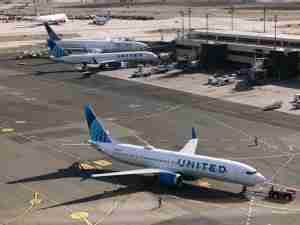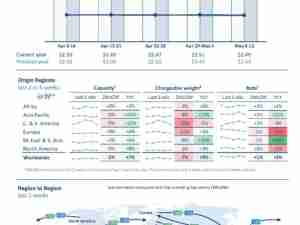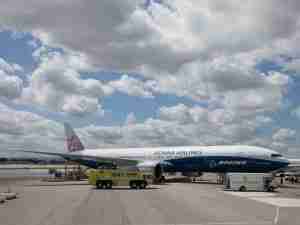Deutsche Lufthansa AG signaled it would make sweeping job cuts and sell off non-core units in order to repay a 9 billion-euro ($10 billion) coronavirus bailout from the German government.
Europe’s biggest airline will slash employee expenses and look at spinning off non-core units to reduce costs and bolster cash flow as the coronavirus crisis depresses revenue, it said in a statement Wednesday. The group had a 2.1 billion-euro net loss in the first quarter.
“In view of the very slow recovery in demand, we must now take far-reaching restructuring measures to counteract this,” Chief Executive Officer Carsten Spohr said in the release.
The pledge to slash costs is likely to lead to a struggle with Germany’s powerful labor unions which in the years prior to the pandemic thwarted efforts to trim expenses with pilot and cabin-crew strikes. While other European carriers are also cutting back, Lufthansa’s situation may be complicated by the state’s pending 20% holding in the airline, which will see government representatives involving themselves in its affairs.
Lufthansa shares were up 1.6% as of 9:31 a.m. in Frankfurt. The stock has fallen 41% since the start of the year.
Labor Battle
Lufthansa wouldn’t be the first German company to run up against labor resistance as it tries to pare costs. Industrial conglomerate Thyssenkrupp AG—once a symbol for German engineering prowess—is selling off or closing entire divisions after years of failed attempts to put the business on a sustainable footing. If Spohr’s cost-cutting drive falls short, he won’t be able to pay down debt and dislodge the state as a shareholder.
“The scale of the restructuring is immense, and agreement with unions on drastic reductions in staff numbers, wages or both will be difficult to achieve,” said Daniel Roeska, an analyst with Sanford C Bernstein.
Unit Sales
Spohr’s bid to sell non-core units won’t be easy either, judging by Lufthansa’s past spin-off attempts. A push to divest its LSG Sky Chefs catering arm met with repeated delays before an agreement was reached to sell the European division to Gate Group Holding AG. Lufthansa earlier this year abandoned an auction process for the international unit.
The airline group has looked at a partial listing of its Lufthansa Technik aircraft maintenance and refit business, people familiar with the matter said previously. While a listing of the unit would give Lufthansa funds to pay down debt, unshackling the division could take years and would deprive the airline group of a reliable income stream. Technik had a pre-crisis enterprise value of 7.5 billion euros, according to Bloomberg Intelligence analysts.
Cuts Elsewhere
The company set out more precise cuts for its foreign airline units, where labor-protection laws are less stringent than in Germany. Austrian Airlines will see staff costs pared by 20%, with Brussels Airlines suffering a 25% reduction in the workforce and a 30% cut to its fleet.
While Lufthansa has said its liquidity position is becoming “urgent,” the statement gave no details on cash levels. The deal will dilute the holdings of current investors, though they’re expected to back it in a June 25 vote rather than risk insolvency.
Airlines worldwide are reeling as the Covid-19 pandemic brings decades of travel growth to a shuddering halt. Industry executives are cutting back the workforce given demand could take several years to return to previous levels.
U.K. rival British Airways has said it plans to cut 12,000 jobs, while discounters Ryanair Holdings Plc, EasyJet Plc and Wizz Air have signaled a total of more than 8,000 positions will be lost. Gulf carrier Emirates has said it will lower headcount, with people familiar with the matter saying the toll could surpass 30,000 workers.
Biggest Bailout
Lufthansa, previously regarded as among the most stable and successful airlines, is negotiating bailout that’s the biggest for the industry so far. Its predicament highlighs both the impact of the virus and Germany’s willingness to come to the aid of its leading businesses.
Lufthansa posted a first-quarter loss of 1.22 billion euros, widening from 336 million euros a year earlier. The imposition of travel lockdowns from mid-February led to an 18% drop in sales, with fuel-hedging losses also hurting the numbers.
The picture will be far worse in the current quarter, during which almost all of the carrier’s 760 planes have been grounded.
Spohr said it’s impossible to provide full-year guidance, beyond saying the result will be significantly worse.











